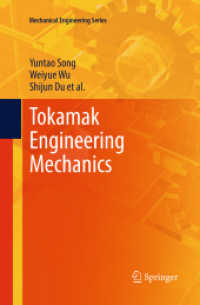- ホーム
- > 洋書
- > 英文書
- > Science / Mathematics
Full Description
Researchers and educational software developers have talked about building authoring tools for intelligent tutoring systems (ITSs), adaptive and knowled- based instructional systems, and other forms of advanced-technology learning environments (ATLEs) ever since these forms of educational software were introduced in the 1970s. The technical complexity and high development costs of these systems contrasts sharply with the common picture of education as a "home grown" activity performed by individual teachers and trainers who craft lessons tailored for each situation. There have been two primary reasons to create authoring tools for ATLEs: to reduce development cost, and to allow practicing educators to become more involved in their creation. The goal of creating usable authoring tools dovetails with the recent trend toward interoperability and reusability among these systems. We use the phrase "advanced-technology learning environment" to refer to educational software on the leading edge of practice and research. These systems go beyond traditional computer-based instruction or educational simulations by providing one or more of the following benefits: ß Providing rich, or even "immersive" interfaces so that students can "learn by doing" in realistic and meaningful contexts. ß Dynamically adapting the interface or content to the student's goals, skill level, or learning style. ß Providing expert hints, explanations, or problem solving guidance. ß Allowing "mixed-initiative" tutorial interactions, where students can ask questions and have more control over their learning.
Contents
Section I: Authoring Tutors for Device and Process Simulations.- 1. SIMQUEST: Authoring Educational Simulations.- 2. Requiem for a Development System: Reflections on Knowledge-Based, Generative Instruction.- 3. Authoring Simulation-Centered Learning Environments with Rides and Vivids.- Section II: Authoring Tutors that Encode Human Expertise.- 4. A Programming by Demonstration Authoring Tool for Model-Tracing Tutors.- 5. Automated Knowledge Acquisition for Intelligent Support of Diagnostic Reasoning.- 6. Formative Evaluation of an Automated Knowledge Elicitation and Organization Tool.- 7. Using Knowledge Objects to Design Instructional Learning Environments.- Section III: Authoring Tutors that Include Instructional Strategies.- 8. REDEEM: Simple Intelligent Tutoring Systems from Usable Tools.- 9. The IRIS Authoring Tool.- 10. CREAM-Tools: An Authoring Environment for Knowledge Engineering in Intelligent Tutoring Systems.- 11. Eon: Authoring Tools for Content, Instructional Strategy, Student Model, and Interface Design.- Section IV: Special Purpose Authoring Tools.- 12. Supporting Educational Software Design With Knowledge-Rich Tools.- 13. Developing Adaptive Educational Hypermedia Systems: From Design Models to Authoring Tools.- 14. The Leap Authoring Tool: Supporting complex courseware authoring through reuse, rapid prototyping, and interactive visualizations.- Section V: General Theories and Designs.- 15. Principles for Pedagogy-oriented Knowledge Based Tutor Authoring Systems: Lessons Learned and a Design Meta-Model.- 16. Authoring Tools for Component-Based Learning Environments.- 17. An Overview of Intelligent Tutoring System Authoring Tools: Updated analysis of the state of the art.- Author Index.








